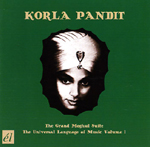|
|
 |
Dusted Reviews
Artist: Korla Pandit Album: The Grand Moghul Suite/The Universal Language of Music Label: El Review date: May. 1, 2008 |

|
|
|
 |
The genre of exotica was a musical niche always grounded in the notion of escape. Popularized during the outwardly conformist ’50s, exotica artists abandoned the soul-crushingly familiar for colorful, though often largely faux, strains of ethnic consciousness. Martin Denny made the transformation from Southern Californian Caucasian to undisputed Tiki King. Yma Sumac absorbed accusations that her claims of Incan princess ancestry were actually attempts to mask origins as a New Jersey record label accountant. Like Sumac, Korla Pandit at least had the requisite melanin to prove his outward credentials. Unlike Sumac, his well-publicized back-story was complete confabulation. Television brought him the big boost, beaming his turban’d visage into thousands of households and burning his seductive, slightly androgynous gaze into easily as many minds. LPs were a natural outgrowth. Compared to peers like Denny and Esquivel, Pandit reissues have been relatively scarce. Odyssey, a 1996 compilation on Fantasy, coupled two of his late-’50s platters. This El Records twofer digs back a bit deeper, excavating The Grand Moghul Suite (1950) and The Universal Language of Music, Volume 1 (1954), albums each affixed with alluringly recondite titles.
A tray card blurb deigns to mention Pandit in the illustrious company of Ravi Shankar and Ali Akbar Kahn. Such lofty comparisons prove only skin deep, as his sound is festooned with the trappings of kitsch. Dramatic gong strokes and cymbal crashes bracket various pieces, but it’s Pandit’s pipe organ that holds center stage throughout. His style is a weird amalgam of Sun Ra and Liberace, prone to phantasmagoric flourishes and climactic orchestral swells, but also regularly milking the bromidic properties of his instrument as well. Moghul is certainly the more “ethnic" sounding of the two albums with romanticized approximations of Middle Eastern modal sources forming the cruxes of “Kumar,” “Kartikeya” (two tunes included in different incarnations on the aforementioned Fantasy collection), and the mad zamboni terpsichore “Trance Dance.” There’s also a plentiful supply of effusive melodic syrup on pieces like the otherwise promisingly-titled “Magnetic Theme.”
Fidelity on these early sides is a bit murky and nondescript, but still more than listenable, and Pandit’s sense of pacing and placement remains impressive. Universal Language brings his powers to play on a program bent more conspicuously toward the banal, at least on the surface. “Clare De Lune,” “Stormy Weather” and “Over the Rainbow” aren’t exactly atypical tunes of the era. Translated through swirling sonorities of the organ, they still exude a respectable level of eccentricity, and the addition of an avuncular narrator, by turns annoying and inexplicable, definitely helps on that score.
Pandit passed away about a decade ago, and with the exotica revival now also a decade diminished, a full blown renascence for his music is probably only a pipe dream. Fictional in origin or not, his persona still has the power to stir and stimulate, making it easy to understand why he was the leading inamorato of legions of housewives in his heyday.
By Derek Taylor
|







